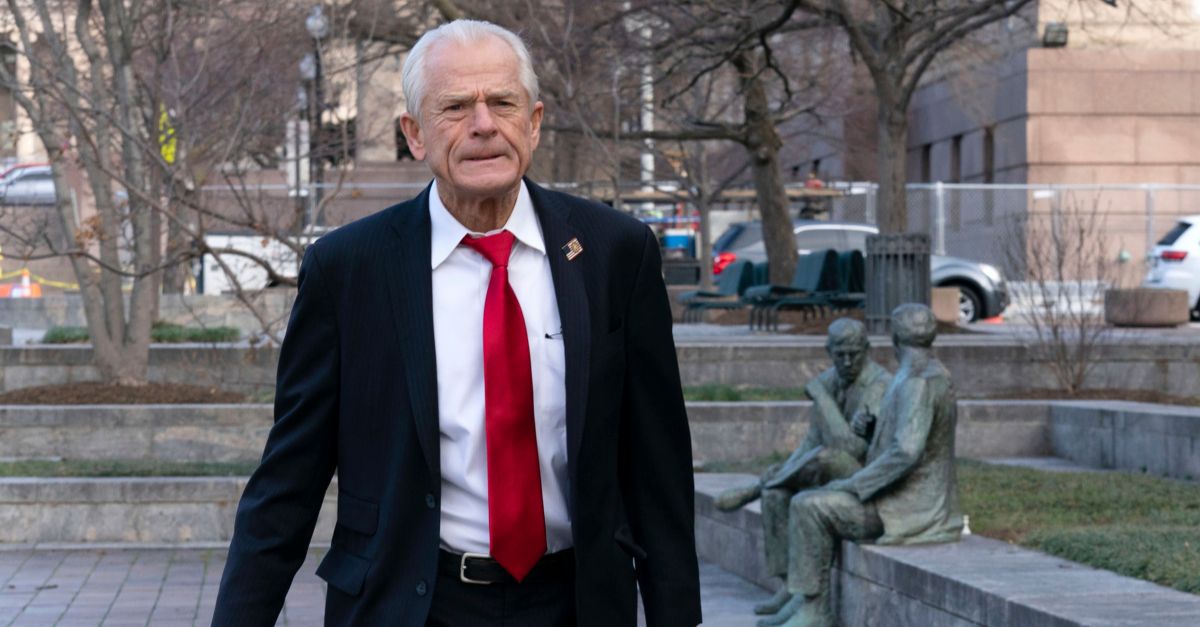
Former Trump White House trade adviser Peter Navarro arrives at the federal courthouse in Washington, Friday, Jan. 27, 2023. (AP Photo/Jose Luis Magana)
Former Trump White House trade adviser Peter Navarro on Wednesday lost a too-clever-by-half attempt to get out of prison early.
Last week, Navarro filed an emergency motion for resentencing with the U.S. District Court for the District of Columbia, requesting an additional 30-day sentence of supervised release on top of the 120-day prison sentence he is currently serving for contempt of Congress.
U.S. District Judge Amit P. Mehta described the logic behind the “unusual request” in a 3-page order denying the request as off-base.
“He asks the court to add 30 days of supervised release to his original sentence,” the court’s order reads, “so that he can secure early release based on time credits earned under the First Step Act through his participation in prison programming.”
In the emergency petition, citing several different federal sentencing laws, Navarro says the Bureau of Prisons is refusing to process him for home confinement near the end of his prison term — effectively because his sentence is already quite short.
The math is complicated but Navarro’s initial argument boils down to what statute takes precedence under the circumstances.
One section of a statute says a prisoner should be placed in “home confinement for the shorter of 10 percent of the term of imprisonment of that prisoner or 6 months,” which, in Navarro’s case, means 12 days out of his total sentence, or after 108 days. Another section of that statute, however, says, “a prisoner who is placed in home confinement shall remain in home confinement until the prisoner has served not less than 85 percent of the prisoner’s imposed term of imprisonment,” or after 102 days.
But, of course, Navarro can’t even begin serving home confinement until after 108 days, so the second section seems inapplicable.
The second part of his argument is a dispute with prison officials.
In his motion, his attorney says, “the Bureau of Prisons has advised Dr. Navarro — irrespective of the lack of any language to this effect within any pertinent statute — that because his period of home confinement would not exceed thirty (30) days, it is not ‘practicable’ for him to be processed for the same.”
The upshot of this argument, Navarro says, is he should just be released from prison entirely after the apparent six-day statutory gap — anticipating a release date of June 17 or June 19 at the latest.
The prisoner gets to that conclusion by way of yet another section of the statute which authorizes the transfer of a prisoner to a term of supervised release based on “time credits” for taking part in “evidence-based recidivism reduction programming or productive activities.”
“Dr. Navarro will then immediately be eligible to begin serving his term of supervised release and will conclude service of his sentence, both imprisonment and supervised release at approximately the same time,” defense attorney Stanley Woodward wrote.
The problem identified by the motion, and noted by Mehta, is Navarro never had a supervised release element to his sentence to begin with.
And, the court observes, the statute cited by the defense does not even allow for the court to do what is being asked by Navarro here.
“Section 3582 thus allows a court to impose a term of supervised release but only after it first reduces the original sentence,” the order reads. “Defendant does not ask the court to reduce his original sentence; instead, he wants the court to tack on an additional 30 days of supervised release. Section 3582 does not permit the court to do so.”
And, Mehta goes on, adding some formalized scorn to the denial, the court is not convinced Navarro deserves to get out early.
“Defendant’s desire to shorten his prison time through First Step Act credits does not, at least in this case, constitute an ‘extraordinary and compelling’ reason to modify his sentence,” the order reads — citing the language from the statute governing the shortening of sentences.
The court goes on to belabor the point for Navarro’s benefit:
At the time of sentencing, the court was aware that imposing a term of supervised release was discretionary. Although the court did not say it then (in part because Defendant never made the request), it will say it now: the statutory factors under § 3583(c) do not warrant the imposition of a term of supervised release. The nature and circumstances of Defendant’s contemptuous conduct, and the need to deter others from doing the same, weigh heavily against including any period of supervision that would allow Defendant to shorten his term of imprisonment.
In January, U.S. District Judge Amit Mehta sentenced the 74-year-old economist to prison time and a fine of $9,500 for repeatedly stonewalling congressional investigators working for the House Select Committee to Investigate the Jan. 6 attack on the U.S. Capitol.
A series of lower court and appellate court appeals followed throughout February and March. Results were consistent and clear: Navarro could, of course, appeal his conviction and sentence — but he had to start serving that sentence when the courts instructed.
Have a tip we should know? [email protected]







